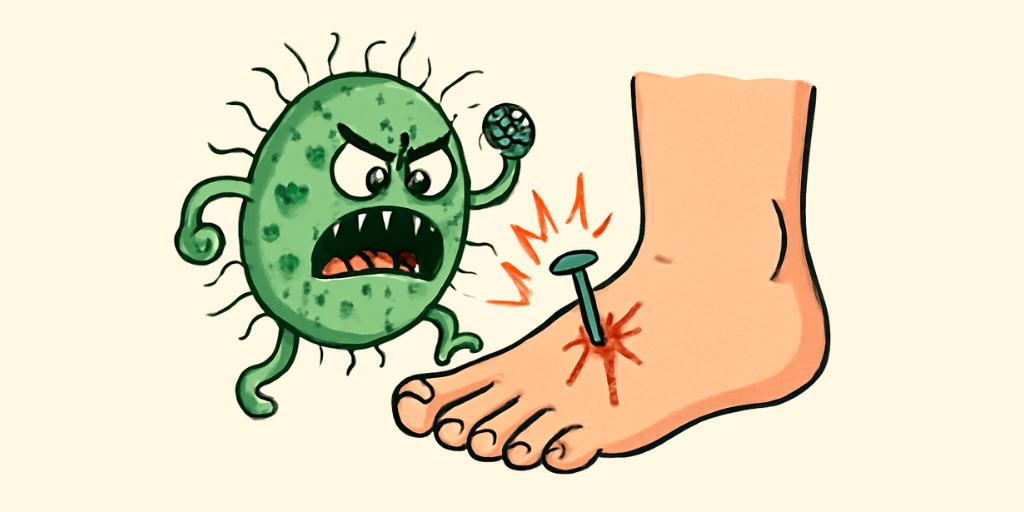Ayurvedic Name: Aptanak
Description:
Tetanus is a severe neurological disorder resembling tetanus, characterized by extreme rigidity, spasms, and lockjaw. This condition is a result of aggravated Vata blocking the normal functioning of the nerves, which leads to painful contractions, difficulty swallowing, and arching of the body due to involuntary muscle contractions. The root causes include deep wounds, infection, excessive dryness, and depletion of Ojas (vital essence). It is considered a critical condition requiring immediate intervention, often managed with Ayurvedic therapies like Nasya (nasal administration of medicated oils), Mardana (massage with warm medicated oils), internal administration of Rasayanas like Bala and Shatavari, and external applications of herbal pastes to relieve muscular rigidity.
Signs & Symptoms:
- Tantuvisha (Tetanus): Muscle stiffness and spasms, particularly in the jaw and neck.
- Trishana (Thirst): Severe thirst, often associated with the inability to swallow.
- Vishama Shwasa (Irregular Breathing): Difficulty in breathing, sometimes caused by spasms in the chest muscles.
- Dourbalya (Weakness): Extreme weakness due to muscle fatigue and spasms.
- Shabda Gharma (Sound Sensitivity): Heightened sensitivity to sound, causing discomfort or agitation.
- Bhrama (Dizziness): Dizziness, often as a result of prolonged spasms or difficulty breathing.
Diagnosis:
Clinical Signs and History of Wound Exposure
Risk Factors:
- Dietary Factors
Inadequate nutrition, particularly vitamin C and zinc, which can impair the immune system’s ability to fight infections, making individuals more susceptible to infections like tetanus.
Poor dietary habits that lead to weakened overall health, hindering the body’s ability to recover from infections. - Lifestyle Factors
Poor hygiene and lack of proper wound care, increasing the risk of tetanus following cuts or punctures.
Exposure to contaminated environments, particularly in rural areas or places with inadequate medical care. - Medical Conditions
Chronic conditions like diabetes, which can impair immune function and increase susceptibility to infections.
Lack of tetanus vaccination, increasing the risk of contracting tetanus from infected wounds.
Complications:
- Muscle Spasms (Mamsa Spasms): Tetanus causes severe, painful muscle spasms, often in the jaw and neck, making it difficult to move.
- Breathing Difficulties (Shwasa Daurbalya): Muscle spasms in the chest can interfere with normal breathing, leading to respiratory failure in severe cases.
- Cardiac Arrhythmia (Hridaya Vyatikara): Tetanus toxin can affect the heart, leading to irregular heartbeats or arrhythmia.
- Bone Fractures (Asthi Bhagna): Continuous muscle contractions can lead to fractures or dislocations.
- Death (Mrityu): In severe cases, untreated tetanus can result in death due to respiratory failure, cardiac arrest, or septic shock.
Epidemeology:
More common in developing countries due to lack of vaccination, particularly in rural or underserved populations.
Affects both men and women, but more common in men due to higher exposure to injuries in work environments.
Global incidence is low in vaccinated populations, but about 1 million cases globally still occur annually, mostly in sub-Saharan Africa and Southeast Asia.
Risk is higher in individuals with poor sanitation practices, particularly after injury or surgical procedures.

